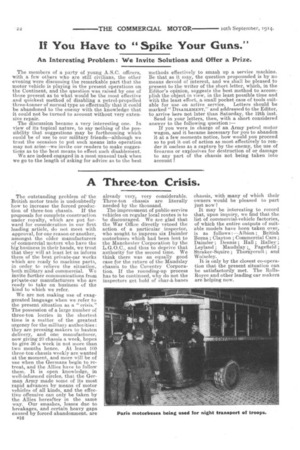A Three-ton Crisis.
Page 4

If you've noticed an error in this article please click here to report it so we can fix it.
The outstanding problem of the British motor trade is undoubtedly how to increase the forced produc tion of three-ton chassis. If the proposals for complete construction under royalty, which are put forward for consideration in our first leading article, do not meet with approval, for one reason or another, amongst the older manufacturers of commercial motors who have the big business in their bands, we trust that they will at least let us inform them of the best private-car works which are ready to machine parts, in -order to relieve the situation, both military and commercial. We invite further communications from prniate-car manufacturers who are ready to take on business of the kind to which we refer.
We are not making use of exaggerated language when we refer to the present situation as a "crisis." The possession of a large number of three-ton lorries in the shortest time is a matter of the greatest urgency for the military authorities : they are pressing makers to hasten delivery, and one manufacturer, now giving 20 chassis a week, hopes to give 30 a week in not more than two months hence. At least 100 three-ton chassis weekly are wanted at the moment, and more will be of use when the Germans begin to retreat, and the Allies have to follow them. It is open knowledge, in well-informed circles, that the German Army made some of its most rapid advances by means of motor vehicles of all kiiids, and the effective offensive can only be taken by the Allies hereafter in the same way. Our smashes, losses due to breakages, and certain heavy gaps caused by forced abandonment, are 1316 already very, very considerable. Three-ton chassis are literally needed by the thousand.
The impressment of public-service vehicles on regular local routes is to be discouraged. We are glad that the War Office directly vetoed the action of a particular inspector, who sought to impress six Daimler motorbuses which had been lent to the Manchester Corporation by the L.G.O.C., and thus to deprive that authoritY for the second time. We think there was an equally good ease for the return of the Maudslay chassis to the Coventry Corporation. If the rounding-up process has to be continued, why do not the inspectors get hold of char-L-bancs chassis, with many of which their owners would be pleased to part just now ? It may be interesting to record that, upon inquiry, we find that the list of commercial-vehicle factories, of which the entire outputs of suitable models have been taken over, is as follows —Albion; British Berna ; Clayton ; Commercial Cars ; Daimler; Dennis ; Hall ; Halley; Leyland ; Maudslay Pagefield ; Straker-Squire ; Thornycrolt ; and Wolseley.
It is only by the closest co-operation that the present situation can be satisfactorily met. The RollsRoyce and other leading car makers are helping now.


















